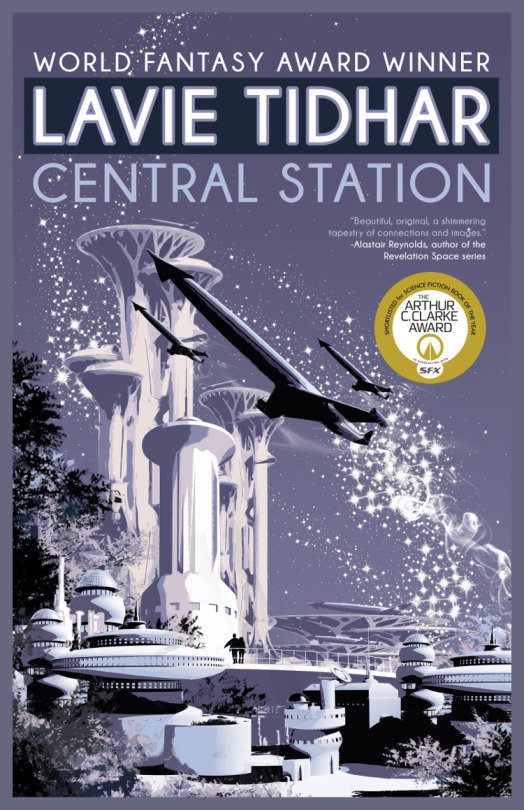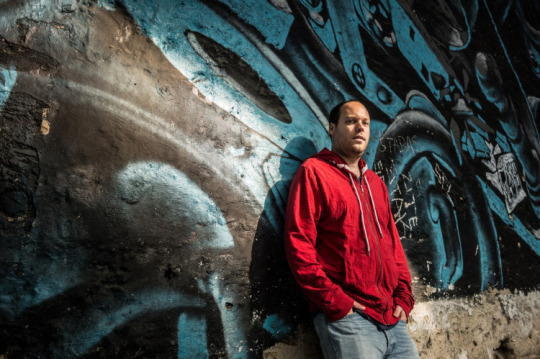Lavie Tidhar’s CENTRAL STATION imagines existence at the cusp of a fundamental transformation
With the imminent announcement of the Arthur C. Clarke Award, the Internet is all abuzz about the award and Lavie Tidhar’s nominated CENTRAL STATION.

At STRANGE HORIZONS, Gautam Bhatia in Part I of a survey of the Clarke nominees, praises the novel.
This is, obviously, a world without the concept of privacy. Indeed, more broadly, it is data that is the central theme of Tidhar’s novel, and individuals’ relationships to data that constitute the lynchpin of their stories: whether it is the doomed Weiwei family, unable to forget anything, or Carmel, the strigoi (“data-vampire”), who depends on feeding upon other peoples’ data streams for sustenance. Tidhar imagines existence at the cusp of a fundamental transformation, but chooses not to wager on what that transformation might look like (extinction of humanity? an unrecognizable modification? a data utopia, a dystopia, or neither?); instead, he writes about human relationships, and individuals attempting to negotiate this new form of life in their own way (readers might experience a vague similarity with Isaac Asimov’s canonical I, ROBOT (1950), another set of stories that excavated how human beings would respond to the reality of automata). There is no conclusion. As one of the characters points out about the god-children: “… what the children represent is a future … not, perhaps, the future, but a future”(p. 57). What that future might look like is left to our imagination.
For THE ANGLIA RUSKIN CENTRE FOR SCIENCE FICTION AND FANTASY, Nina Allan provides a personal view of the nominees entitled Mega-Sharke vs. Giant Octopus.
Let us turn first to Lavie Tidhar’s CENTRAL STATION, the novel from the official shortlist I came closest to picking for my personal shortlist and conversely the only one of the six that I have not reviewed in depth. The reason for this is simple: my fellow Sharkes have already said everything that might possibly be said about it, and said it brilliantly. The only thing I have to add is a slight reservation – that the language of CENTRAL STATION owes a little too much to M. John Harrison’s Kefahuchi Tract trilogy – which, given the breadth of imagination and technical ability on display here, feels too nit-picky to be a sensible contribution. Any argument that CENTRAL STATION might be more accurately described as a collection of short stories rather than a novel seems entirely spurious to me. The individual chapters – as I prefer to call them – were clearly written with the intention that they be read together and form a striking and cohesive whole. The shifting of viewpoint, the recurrence of themes and characters, the unifying sense of place create a tantalising mosaic effect that is vibrant and also inclusive – we are invited into the city as fellow citizens, as participants rather than onlookers. This novel is entertaining, clever, poignant, inventive, prescient and beautifully written. CENTRAL STATION thoroughly deserves its place on the shortlist and I would be more than happy to see it go on to win the award.

Photo: Kevin Nixon. © Future Publishing 2013
Lydia Nicholas at NEW SCIENTIST in yet another article about the award, discusses the book.
THE first Arthur C. Clarke Award for best science fiction novel went to Margaret Atwood’s A HANDMAID’S TALE in 1987. It’s a book which many commentators still refuse to call “science fiction” because it doesn’t grapple with the shiny stuff we might get in the future. Instead, it deals with how lines of power and identity might be redrawn and society restructured along the lines of a nightmare.
Reflecting the UK’s own fractured, unstable identity, all of this year’s nominees share an interest in the relationship between person, system and machine.
<snip>
A fractured set of interwoven stories, groggy with author Lavie Tidhar’s love for a future Tel Aviv, CENTRAL STATION (Tachyon) reflects the city’s crowded, chaotic setting. But through the chaos runs a hunger for faith and connection, as characters suck data or neck pills in an attempt to achieve a consensus reality.
<snip>
If individually the novels cover a thrilling range of horrors and monsters, as a collection they offer grounds for hope. In these worlds of chips, nodes or artificial assistants, people still reach out to loved ones. Even owned and tortured characters find fragments of joy, and the will to fight for more.
For more info about CENTRAL STATION, visit the Tachyon page.
Cover by Sarah Anne Langton
